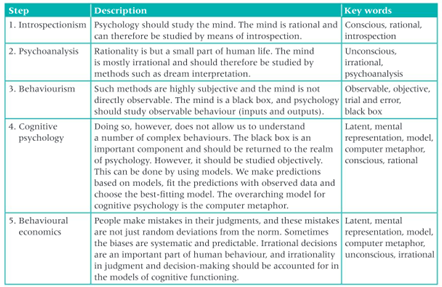The cognitive approach in psychology centers on the study of mental (cognitive) processes such as memory, thinking, and decision-making. However, since the mind itself is a construct that cannot be directly observed, cognitive modeling serves as a key method to understand and predict behavior.
The approach is based on 4 principles
- 1. Mental processes can be studied scientifically
- 2. Mental representations guide behavior
- 3. Cognitive processes do not function in isolation
- 4. Cognitive biases exist and they can be systematic and predictable
As psychology embarked on a journey to establish itself as a scientific discipline grounded in observable phenomena, these five stages unfolded:

Introspection (Late 19th Century):
Psychology initially relied on introspection, where individuals examined their conscious experiences. This method aimed to understand subjective phenomena but lacked empirical verifiability.
Psychoanalysis (Late 19th to Early 20th Century):
Freud introduced psychoanalysis, emphasizing the role of the unconscious mind in shaping behavior. Techniques like dream analysis were used to explore unconscious drives and desires inherited from ancestors.
Behaviorism (Early to Mid-20th Century):
Behaviorism emerged as a rejection of the unobservable aspects of the mind. It focused solely on observable behaviors and their relationship with stimuli and responses. Operant conditioning, proposed by Skinner in 1937, demonstrated how behavior could be shaped through reinforcement and punishment.
Cognitive Psychology (Mid-20th Century):
Tolman’s critique of behaviorism led to the rise of cognitive psychology in the 1950s. It viewed the mind as an information-processing system akin to a computer, with internal cognitive processes guiding behavior. Models were developed to describe how information is received, encoded, stored, processed, and exchanged within the mind.
Behavioral Economics (1970s):
Kahneman’s work in 1972 highlighted cognitive biases in decision-making, challenging the rationality assumptions of traditional economics. Behavioral economics integrates psychological insights into economic models, recognizing systematic deviations from rationality in decision-making under uncertainty.
Source
Popov, Alexey, Lee Parker, and Darren Seath. Oxford IB Diploma Programme: Psychology Course Companion. Oxford University Press-Children, 2018.
